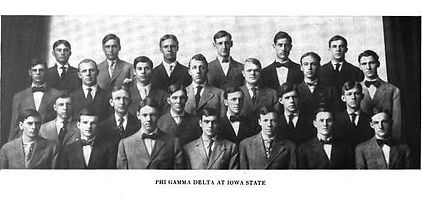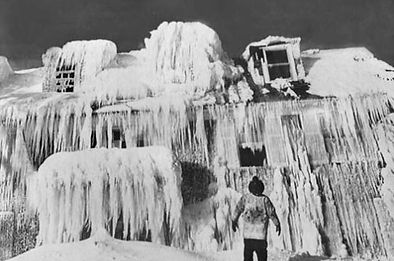
International History
Phi Gamma Delta was founded on May 1, 1848 by six men: Samuel Beatty Wilson, John Templeton McCarty, Ellis Bailey Gregg, Daniel Webster Crofts, James Elliot Jr., and Naaman Fletcher. The fraternity was founded at Jefferson College in Cannonsburg, Pennsylvania. Fiji expanded from these humble beginnings to include more than 170,000 members, with chapters on 137 campuses and colonies on a further 13.
The National Phi Gamma Delta headquarters is located at 1201 Red Mile Road Lexington, Kentucky, which offices many Phi Gamma Delta Staff, Staff of the Phi Gamma Delta Education Foundation, as well as a museum, library, and living quarters for Phi Gamma Delta field secretaries.
The current International Headquarters building at 1201 Red Mile Road was completed and occupied in May 1985. Brothers, pledges, and family members are encouraged to visit the International Headquarters whenever visiting the area.
Iowa State History
It was required that each state have at least one college, and Ames was chosen to be the location in 1858. However, the state did not have the funds to build or start the new college until the Morrill Act of 1862. This allowed for the selling of federal lands to fund at least one college per state. Iowa was the first to take advantage of this program, leading Iowa State to be called the first "Land Grant University". On March 18, 1869, the State Agriculture College and Model Farm opened under its first president Adonijah Welch.
The original name of the college's sports teams was the Aggies, however, in 1895, the football team gained the nickname "Cyclones" after their performance against Northwestern University and it stuck.
The name of the college was changed to Iowa State College of Agriculture and Mechanic Arts in 1898 and officially renamed Iowa State University of Science and Technology on July 4th, 1959. At that time the newly renamed university also divided itself up into the individual divisions. These divisions are the College Agriculture and Life Sciences, College of Business, College of Design, College of Engineering, College of Human Sciences, College of Liberal Arts and Sciences, College of Veterinary Medicine. Altogether it offers 96 Bachelors degree programs, 115 Masters programs, 83 Ph.D programs, and one professional degree program in Veterinary Medicine.

Chapter History
Our history begins in 1897, when a group calling themselves the “Noit Avrats” formed. The students of the time dined at Margaret Hall, twelve to a table. The soon-to-be Noit Avrats found the food to be particularly dissatisfying, and thus banded together as a "revolt on the part of twelve congenial souls against the nauseating and villainous cookery in the old Margret Hall dining room of the college". In the years following the Noits would host regular banquets. As their bonds of friendship grew, so did the group itself.
Unfortunately, at this time Iowa State had adopted a strong anti-fraternity policy, banning all forms of fraternal organizations. Yet this proved futile as it failed to preclude the formation and continual growth of the Noit Avrats. In 1902, the president of Iowa State, William Beardshear, suffered a fatal heart attack. The following year a man by the name of Albert Storms assumed the position of university president, and in 1904 lifted the fraternity ban. The future of the Noit Avrats looked much brighter.
In January of 1903, before the lift of the ban, the Noit Avrats moved in to
their first house at 203 Pike Avenue with a total membership of 22. With
the lift of the ban and the influx of greek organizations, the Noit Avrats
began looking into a similar “greek” title. They pursued a few
well-established national fraternities, including Phi Gamma Delta. The
Noit Avrats contacted the secretary of Phi Gamma Delta which, through a
series of correspondences, lead to Edward P. Prince (Illinois Wesleyan,
1902) visiting the Noits. Greatly impressed by this group from Iowa State,
he spearheaded the Noit’s campaign to join the ranks of Phi Gamma
Delta. The Noits eventually found success, and on September 21st,
1907, the Noit Avrats became the Alpha Iota chapter of Phi Gamma Delta.
Edward “Pa” Prince has since been regarded as the father this chapter.
In 1908, the Fijis moved into their second house on 158 Hyland Avenue. This house was built to the specifications of the Noits by one of the founders of the Noit Avrats, E. A. Pattengil (Iowa State 1897). February 27th, 1909 marked our very first Norris Pig Dinner, an annual event welcoming back graduates of the chapter.
The chapter continued to grow and by 1913 the house at 158 Hyland Avenue was no longer large enough for the chapter. Accordingly, with the help of a strong graduate network, Phi Gamma Delta raised money for and built a new chapter house at 325 Ash Avenue. The house was designed and constructed by an undergraduate brother, Mo Harrison (Iowa State 1917), and it has remained the Phi Gamma Delta chapter house since.
When the United States became involved in World War I, one third of all Fiji's volunteered for active duty, and this chapter was no exception. One particularly outstanding member of this chapter is Guy S. Brewer (Iowa State 1897), who was one of the founders of the Noit Avrats. Brewer served in the Spanish-American War and World War I. When America became involved in World War I Major Guy S. Brewer was in command of the 3rd battalion of the 168th infantry Rainbow Division. Under his command, the battalion distinguished itself in the capture of Sergy, France. During an assault on St. Michel Major Brewer personally lead the charge. During the charge he was wounded by a shell fragment, and then lost his right arm to machine gun fire. Despite his injuries he stayed on the battlefield for more than an hour, directing his men and giving detailed instructions to his second in command. For this he was promoted to lieutenant colonel, awarded the Croix De Guerre for the French, and awarded the Distinguished Service Cross from General Pershing. Lieutenant Colonel Brewer is pictured here standing on the left side of the front row.
Another Fiji served his country in World War I in a very different way. George L. McCain (Iowa State 1909) worked for Packard Automobile Company when the war broke out. Packard was commissioned by the United States government to design a better aircraft engine, since the aircraft the the Germans where much superior to the Americans, and McCain was the engineer who was selected to head the project. The resulting engine known as "The Liberty" proved very effective and aided the allies in gaining air superiority.
By the mid 1920's Fiji's had emerged as a leading chapter on campus and nationwide. Accordingly this chapter was awarded the Cheney Cup for the 1924-1925 school year. The Cheney Cup is the award from the International Fraternity of Phi Gamma Delta given to the best chapter nationwide as shown by campus activities, relations with the international fraternity, and scholarship.
In 1931, tragedy struck the members of Phi Gamma Delta. One of the outstanding undergraduate brothers, Lynn Fuhrer (Iowa State 1931), was killed by a drunk driver just a week before graduation. As a member of the Army ROTC, YMCA and various other campus associations, he was one of the most outstanding undergraduate brothers. After his death, his parents donated a lodge to the YMCA, and Phi Gamma Delta donated a flagpole and a plaque. The lodge still stands to this day.
In 1941 Fiji adopted their first house mother, Louise Huntington Rowe. She was a charter member of Pi Beta Phi when it returned to campus in 1904. She was an active part of the house daily life. Whether it was her mug collection, rolling celebratory cigars, writing songs, or even participating in intermurial games. In the fall of 1951, she was featured in an article of the Des Moines Tribune as "The Fraternity House Mother - The Twelfth Player On The Team" referring to how, in a football game between Phi Gamma Delta and Delta Delta Delta she hid the football in her dress to score the winning touchdown. She retired in March of 1959 due to failing health.
On September 20, 1951, Frank Anderson (Iowa State 1950) distinguished himself as a soldier in the Korean War. As a Marine on the front lines "...a strong enemy counter-attack, supported by an intense mortar barrage, was launched against his defense positions". During the assault this was said of Anderson: "his coolness under fire and outstanding professional skill contributed greatly to hurling back the fanatical assaults of the numerically superior enemy". For his actions that day, Frank Anderson was awarded the Silver Star.
The chapter also now had its second housemother Gretta Bellamy. As an accomplished piano and organ player she would often accompany the men in song practices and house parties. She remained the housemother until retiring in 1968. She was replaced by Zillah Hibbs, who stayed housemother until 1973, who was in turn replaced by Geri Swaim who stayed until 1977. After 1977 the house mother program died out for nearly two decades.
On January 15, 1982 tragedy struck again. It was the coldest day of the year,
and classes were canceled. Then around 4 pm members of the house noticed
that smoke was coming from the lower floors. The cause of the fire is that the
chimney ash pit overflowed and started a fire in the basement. Everyone was
evacuated, but the fire gutted the house. The winds were so strong that the
fire lasted until dawn, and the air was so cold that the ice froze to the house
leaving it standing. The image to the right is from Life Magazine and was one
of the pictures of the year.
The men of the fraternity where left without a chapter house. Graduate and
undergraduate brother pitched in to clear debris, raise money, and rebuild
the house. In particular Bob Logan (Iowa State 1955) and his construction
company was essential to removing the debris with the help of hired
undergraduate members. Larry VanderPool (Iowa State 1968) spearheaded
the rebuilding process and was a big factor in the house being rebuilt. The
house was completely rebuilt by the fall of 1983. When the house was rebuilt it retained the same design both inside and outside.
Recently this chapter is has been growing to new heights. Our GPA has consistently been among the top for fraternities. Also, our on campus involvement is increasing every semester with clubs, professional societies, and honorary societies. Finally, we are also one of the largest chapters on campus, with members in many different areas colleges and majors.
Our beloved house mother, Joyce Allen, but the brothers refer to her as Mama Jo, originally started her duties at the Phi Gamma Delta house back in 2007. She is the reason our house is clean, our day-to-day tasks get done, and the first person we go to when there is a big problem that needs to be fixed. Mama Jo is the reason our house looks so great and the concrete that holds our house together. G Jo means so much to us for how significant she is, and every brother is sure to treat her with the utmost respect. She is the glue between generations, keeping us connected with the brothers who graduated before us. We are incredibly grateful she is our house mother, and the time G Jo has sacrificed to make the fraternity a better place is overwhelming and astonishing.


